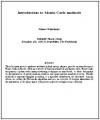
Computational Physics
by Konstantinos Anagnostopoulos
Publisher: National Technical University of Athens 2014
Number of pages: 682
Description:
This book is an introduction to the computational methods used in physics, but also in other scientific fields. It is addressed to an audience that has already been exposed to the introductory level of college physics, usually taught during the first two years of an undergraduate program in science and engineering.
Download or read it online for free here:
Download link
(multiple formats)
Similar books
 Computational Turbulent Incompressible Flow
Computational Turbulent Incompressible Flowby Johan Hoffman, Claes Johnson - Springer
In this book we address mathematical modeling of turbulent fluid flow, and its many mysteries that have haunted scientist over the centuries. We approach these mysteries using a synthesis of computational and analytical mathematics.
(13889 views)
 Multigrid Methods for Structured Grids and their Application in Particle Simulation
Multigrid Methods for Structured Grids and their Application in Particle Simulationby Matthias Bolten - John von Neumann Institute for Computing
This work is focused on the application of multigrid methods to particle simulation methods. Particle simulation is important for a broad range of scientific fields, like biophysics, astrophysics or plasma physics, to name a few.
(8866 views)
 Introduction to Monte Carlo Methods
Introduction to Monte Carlo Methodsby Stefan Weinzierl - arXiv
These lectures given to graduate students in high energy physics, provide an introduction to Monte Carlo methods. After an overview of classical numerical quadrature rules, Monte Carlo integration and variance-reducing techniques is introduced.
(11290 views)
 Computational Nanoscience: Do It Yourself!
Computational Nanoscience: Do It Yourself!by Johannes Grotendorst, Stefan Bluegel, Dominik Marx - NIC
This volume focuses on the application of electronic structure calculations and dynamical simulation techniques covering aspects of solid state physics, surface and nanoscience, chemical reactions and dynamics, magnetism and electron transport, etc.
(19667 views)